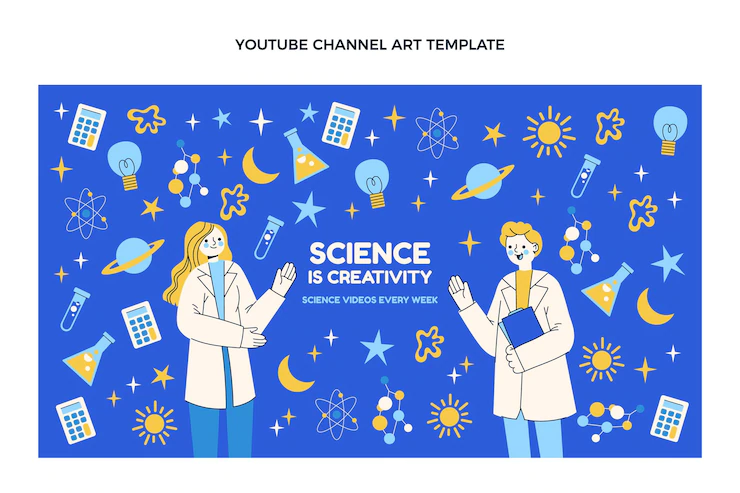
Online educational programs are quickly finding their place among students, professionals, researchers, and teachers. Science e-learning has grown nearly 900% in the last 20 years, and almost 1 billion people have taken advantage of what all that online teaching and learning have to offer.
Free e-learning via YouTube videos is becoming a popular way for researchers and teachers to reach audiences around the world.
Webinars from prominent researchers, videos with science lessons, and even lessons from Ivy League institutions have their own channels with millions of followers. Among the hundreds of different choices for e-learning, there are YouTube science channels for all students, researchers, and professors with easy access to teaching and research.
In this DoNotEdit article, we are going to introduce you to 13 popular YouTube channels for smart researchers.
What are the benefits of e-learning?
E-learning crosses the boundary of diversity and can reach a wider audience. There are several scientific channels that respond to the scientific and research needs of graduate students, professionals, and researchers.
More teachers and professors are using YouTube science channels to express additional points of their lessons. These channels are easily accessible for online learning and link to videos and channels with similar content.
Top YouTube Science Channels
Out of the thousands of channels, these stand out because of their quality content, the number of subscribers, and the number of Twitter followers.
Brusspup:
This channel specializes in visual science and illusions. Videos feature episodes set to music, paced in fast-forwarded action, such as “Ultimate Illusions and Science Compilation.”
Minute Earth:
Living up to its name, Minute Earth focuses on biology and earth sciences and delivers segments that are short and concise. Fun cartoon-like graphics and sound effects make this channel a favorite for younger audiences, such as “A Disease’s Guide to World Domination.”
Veritasium:
A little more formal, this channel delivers lectures, interviews, and experiments. Two of their top videos are “Can Silence Actually Drive You Crazy?” with 15 million views, and “Anti-Gravity Wheel?” with 19.4 million views.
Vsauce:
Divided into seasons called Mind Field, creators tackle difficult scientific questions with the latest discoveries/inventions. Slowly growing in popularity, fun graphics and humor accompany videos, such as “The Greater Good”, talking about self-driving cars, or “The Psychedelic Experience”, discussing drug effects on the brain.
Ted Talks on Science:
Ted Talks has been one of the most popular supplemental tools for teachers. A creative take-on lecture-based learning, Ted Talks brings in experts from around the world to discuss some of the most current research, such as the tech breakthrough series.
Life Noggin:
An animated channel, Life Noggin discusses a variety of topics, such as “What If You Never Ate Fruits and Vegetables?”
Yale Courses:
Making its famous Ivy League education free, Yale Courses offers several online lectures by faculty members. The science channel has over 33k views for single episodes and covers a variety of topics from biology and chemistry to life and medical sciences.
Stanford Online:
Similar to Yale’s channel but with a more personal context, Stanford Online delivers lectures on various scientific subjects.
The videos often feature lecture-style episodes by graduate students, such as “Stanford Seminar-Combining Physical and Statistical Models in Projected Global Warming.”
Scientific American:
With some of the latest and most up-to-date information, this channel is similar to the television program and explores themes such as “New Volcano Survey for Materials Ejected from a Volcano.”
Mental Floss:
Taken from a popular magazine, these videos combine popular culture and science to deliver facts in animated and live videos, such as “50 Science Misconceptions.”
ASAP Science:
Creators of this channel are devoted musicians as well as scientists and find ways to infuse music into their segments. Relying heavily on humorous science subjects, one of the most famous clips is “Are you smarter than average.”
If you want to avoid incorrect citations, click here.
Smarter Every Day:
Focusing more on the scientific method and proving scientific experiments as true or false, this channel has nearly 17 million viewers. Known also as SED, the creators describe how the brain reacts to simple tasks, like riding a bicycle after a brain injury in “The Backwards Brain Bicycle.”
SciShow:
At nearly 5.4 million followers, the SciShow brags that they “hate not knowing things.” The channel offers the latest SciShow News such as “The Trouble with This Year’s Flu Season,” or quick questions like “What Do Dogs See When They Watch TV?”
One of the things that make online video learning so effective in science is its viewer-centered approach. This creates an accommodating atmosphere that engages modern learners from all backgrounds. In what ways do these Science YouTube channels help you? Do you have any favorite YouTube channels that you follow for fun learning? Do share with us in the comments section below!
